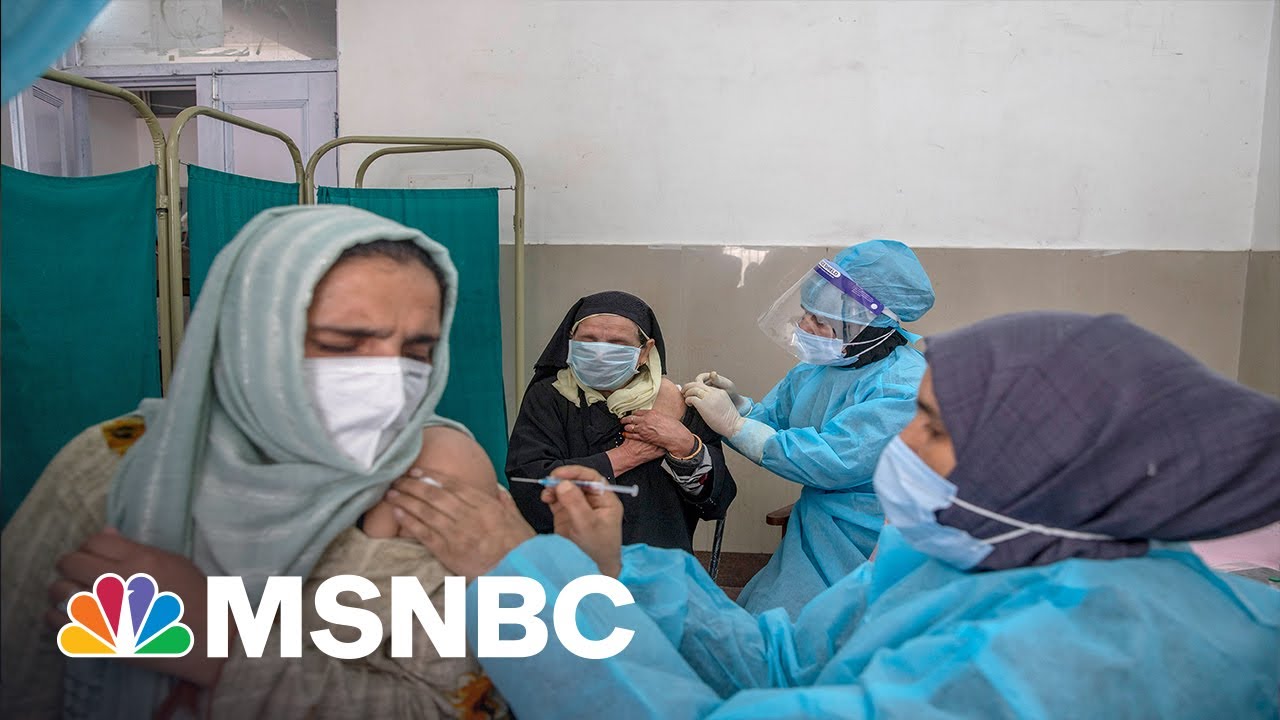For a third consecutive day, the number of new coronavirus cases in India has topped 400,000. India, South Africa and the World Health Organization are now calling on the World Trade Organization to waive the patents to vaccines to allow wider access to produce them. Pharmaceutical companies and some health officials oppose the idea, however President Biden and the majority of Democrats support it. NBC’s Joshua Johnson spoke with Congresswoman Jan Schakowsky (D-IL) about why she believes it’s the right course of action.» Subscribe to MSNBC:
MSNBC delivers breaking news, in-depth analysis of politics headlines, as well as commentary and informed perspectives. Find video clips and segments from The Rachel Maddow Show, Morning Joe, Meet the Press Daily, The Beat with Ari Melber, Deadline: White House with Nicolle Wallace, Hardball, All In, Last Word, 11th Hour, and more.
Connect with MSNBC Online
Visit msnbc.com:
Subscribe to MSNBC Newsletter:
Find MSNBC on Facebook:
Follow MSNBC on Twitter:
Follow MSNBC on Instagram:
As India Covid Crisis Continues, Calls Grow To Waive Vaccine Patents | MSNBC






Agenda 21 in motion 😳
WTF….
@robert hollingsworth un aware are you?
😆 nutcase
@Roger Wilco
troll
who else is enjoying a break from the spam calls selling meds?
shut up
India is a major manufacturer of a drug that is being widely used in Mexico, Panama, Bulgaria, the Czech Republic, Slovakia, Portugal, Zimbabwe and South Africa and appears to have resulted in huge drops in new cases. In the case of Portugal, they are probably using the same drug manufactured right there in Portugal. Just look at the data for the countries I’ve listed.
@Lp78Ch no one stopped its use. Ivermectin was only used as a prophylactic. Ivermectin can only be used once a year. It has NOT helped anyone there who has severe symptoms of covid.
@psycobleach46 tullis ” Ivermectin can only be used once a year.” I have a friend that lives in Brazil and has access to it over the counter. He has been taking 12 mg every two weeks for about a year now with absolutely no side effects! If you have any questions for him, I have him on WhatsApp as we speak.
@Lp78Ch “I don’t know who or what stopped it.” Yup! WHO stopped it is right!
@asearchie not coincidence, indian government declared victory from virus in February, and lifted all restrictions, millions of party rallies were organized, and just a month ago, they had a festival were millions religious Hindus took bath in the same river!
These series of event has caused surge in cases & death rates
@asearchie he would NOT be taking it for over a year, for 5 days only, It does have side effects it is listed on the pamphlet. Ivermectin is NOT sold over the counter either.
Waiving patents doesn’t solve supply chain issues with equipment and components. It also does nothing to build manufacturing capacity or expertise. It’s not necessarily a bad idea, but it won’t solve the problem in isolation.
That’s true, among other things. Obviously, these politicians have no clue what they are talking about.
Considering India currently manufactured 60% of the world’s vaccine output the supply chain isn’t the issue here.
It is more of a QC problem. Just look at J&J. The problem was caught because of tight quality control. Oversea labs running multiple vaccines at the same time is very problematic. One huge mistake would cause irreparable damage to the confidence of the vaccine.
Taj Mahal 2.0
Our Beloved Dictator Modi is Building
a New Taj Mahal for himself instead
of Providing Vaccines to us. 🤦♀️
Modi is India.s trump ..and Brazils bolsonaro
Indian Government is Taxing the Vaccines 🤦♀️
Hope you make Removal of Taxes on
Vaccine as a Precondition. 😔🙏
You need therapeutics, not vaccines. Vaccines takes weeks to implement. To prevent death you need viable therapeutics that you can distribute quickly. Start with Ivermectin.
@Lp78Ch ok doc
I how I elp you?
Indian Government is Blocking Pfizer Vaccine
Release into Indian Market for 2 Months.
They are Not Serious about Vaccinating
Indian Public. 🤷♀️🤦♀️
Since it doesn’t work all that well and will cause more harm than good that’s wise.
.002% death rate.
Veddy veddy good
Dr. Tess Lawrie a physician who runs a evidence based medicine consultancy business in the UK and lists the UK NHS and the WHO as two of her main clients has issued a scathing commentary on the fixation of these organisations on large clinical trials. From her closing address on April 25 to a international covid conference host by the UK based BIRD Group over that weekend she said:
“These requirements play into the hands of big pharma who are the only ones who can afford such trials. Large randomized clinical trials of generic medicines and non-pharmaceutical interventions which deserve to be evaluated for a number of viral and cancerous conditions are rare because frankly there is no money to be made and there is no funding available.”The entire address can be viewed by searching on YouTube for : “IICC conference end – Dr Lawrie’s Speech”
that’s too cerebral for this crowd
@Pohaku Mana Oops! Sorry! 😉
@Pohaku Mana Not all off this crowd, some of us get what is going on here after the HIV crisis in Africa.
@Nicky Brooks yea well I was born in SF right after Operation Sea Spray . long before aids.
paid actors in the thumbnail
Waiving the patents is a good idea but it’ll take months to ramp up production anyways so it will be a fruitless effort at this point.
Your point is so obvious, the Democrats here are too stupid to realize. India needs therapeutics now.
Styxhexenhammer666 it would NOT take weeks to ramp production and it would NOT be fruitless, you sound like the type to give up easily, like oh well to many zombies i might as well die now instead of fighting.
@Lp78Ch the point is rediculous. It would NOT be fruitless to ramp up production. India has been using therapeutics doesn’t seem to be helping now does it.?
@psycobleach46 tullis The question is: Which therapeutics???
@Lp78Ch they have been using ivermectin and HCQ, plasma,
Using drugs without evidence
Among the covid-19 treatments that have been heavily used in the last 12 months despite question marks about their efficacy are the anti-inflammatory drugs tocilizumab and itolizumab and the antivirals favipiravir and hydroxychloroquine.
While the manufacturers of favipiravir and itolizumab have claimed efficacy of these drugs based on inconclusive clinical trials, large randomised trials have shown no benefit on mortality from hydroxychloroquine. For plasma and tocilizumab, randomised trials suggest that they may help only during a small time frame—very early in the disease course for plasma, and within 24 hours of admission into the intensive care unit for tocilizumab.2
Yet, India’s ministry of health and state governments have included the drugs in their covid-19 treatment guidelines, often going against evidence from randomised trials and triggering the widespread and routine use of these drugs by doctors. A Twitter search for plasma and tocilizumab shows several requests from patients’ families looking urgently for them in the second half of 2020, at a time when trials had failed to confirm plasma’s efficacy in moderately and severely ill patients, and tocilizumab’s efficacy at multiple stages of the disease.
No medical intervention is harmless, says Kalantri, which to him means that using any drug indiscriminately without evidence of efficacy is unjustified.
The BMJ contacted members of teams that drafted the health ministry guidelines and guidelines for three state governments: Karnataka, Maharashtra, and Kerala. The BMJ also contacted the health ministry but did not receive a response.
K S Sathish, a pulmonologist who helped develop Karnataka’s guidelines, agreed that hydroxychloroquine and itolizumab had no place in covid-19 treatment and would be removed from the guidelines soon. At the time of writing, Karnataka state guidelines have not been updated since October 2020, and continue to recommend these drugs.
Shashank Joshi, an endocrinologist at Mumbai’s Lilavati Hospital and Research Centre, who helped develop Maharashtra’s treatment guidelines, said that although the government was recommending tocilizumab, itolizumab, and plasma, these drugs had been flagged as “experimental” and it was up to doctors to decide whether to use them.
Another doctor, who helped develop Kerala’s guidelines and spoke to The BMJ under anonymity, said the Kerala government was forced to include hydroxychloroquine in their recommendations because the health ministry was continuing to recommend it. He said that it was difficult to rely entirely on randomised controlled trials carried out in other countries for treatment decisions in India, and that the lack of trials in the Indian population made it harder to create guidelines.
Approvals without evidence
Medical experts have also questioned the hasty approval of drugs for treatment of covid-19 by the drugs controller general of India (DCGI), India’s top drug regulator.
One example is favipiravir, an influenza drug originally developed by the Japanese firm Fujifilm. In June, an Indian firm, Glenmark Pharmaceuticals, claimed that its randomised controlled trial of 150 patients had found the drug to be effective,3 leading to the DCGI approving the drug for covid-19 treatment. But critics countered that the Glenmark trial had failed to show the drug’s benefits conclusively.
Despite the inconclusive results, favipiravir’s approval by the DCGI led to several state governments including the drug in their guidelines, and to doctors using it widely. “In Mumbai, this drug is being prescribed like tap-water. It has become difficult for physicians to refuse to give it to patients, because patients are demanding it,” says Pinto.
Such overuse of a drug whose efficacy is unknown is not without downsides, Pinto points out. Patients treated with favipiravir may have a false sense of security and may delay treatment when their symptoms worsen. Furthermore, as the Glenmark trial found, patients receiving favipiravir were more likely to suffer adverse events such as altered liver function and pneumonia.
Just a month after the approval of favipiravir, the DCGI approved itolizumab, based on a randomised trial of only 30 people,4 causing surprise among medical experts. The Bengaluru based firm Biocon had marketed this drug as a less expensive substitute for tocilizumab, which was already widely used at the time to treat the inflammatory phase of covid-19. But at least four randomised trials published since then, which recruited patients at various stages of covid-19, failed to show that tocilizumab cut deaths
India is already producing huge quantities of Coronavirus vaccines. What good would a waiver of the patents for the new, highly complex mRNA vaccines do them?
In Germany it took Biontech 8 months to retool an existing production plant to make their vaccine.
I don’t understand as MSNBC was totally against this last week. Please explain!
They say what they’re told. Journalism is dead.
@DAVID you work for msnbc? lol
@Pohaku Mana Yea I work for MSNBS yo mama
I was going to get a COVID shot and then I got high
Chinese Military Discussed Weaponizing COVID In 2015 ‘To Cause Enemy’s Medical System To Collapse’
October 2019 Wuhan Military Games the US attended. Bringing gifts from Ft. Detrick.
Donald Ducko that was SARS not covid. and no they are NOT the same.
Yeah and it will continue worldwide because the shot IS the pandemic.
lol that’s so funny, you must be from texas Q
@Pohaku Mana Q? Do you believe in flat earth too?🤣
Demeaning other countries and races in their capabilities is not a new concept. That has been the blue print in history to today! They are too dumb to do it right, so don’t even give them a chance.
What would waving patents help if US doesn’t allow the export of raw materials!
page 20 Tragedy and Hope, by Carole Quigley, publish in 1966
All patients 🙌 are not for the purpose of preventing medicine from being made to save lives… therefore… fix it.
The recipe is just a word, you need all kinds of back up to get product. Guess what need means: resources are depleted.